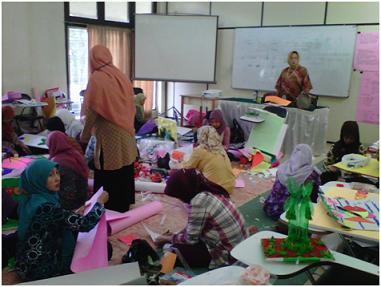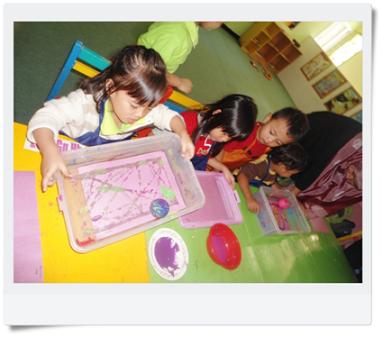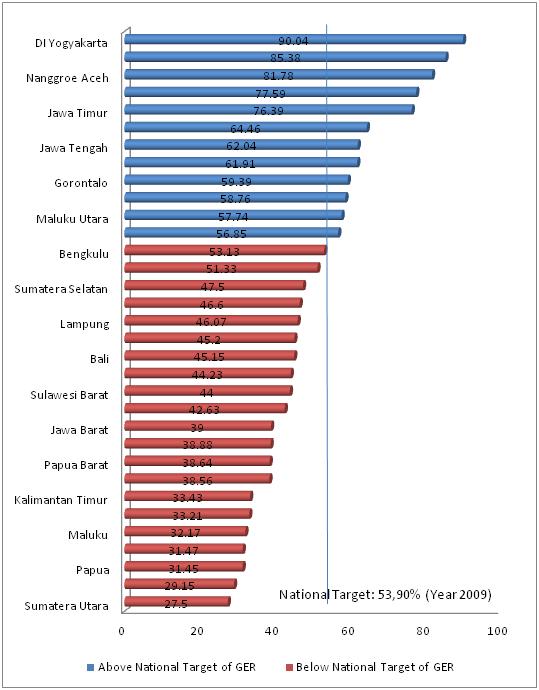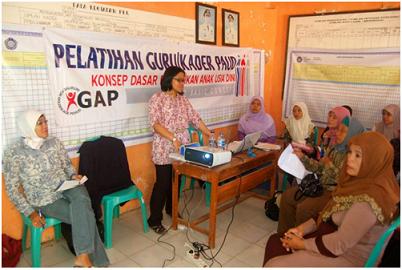ECCE in Indonesia: Policy and Challenges
- Part1
- Part2 (This paper)
In Part 1 of the article, I have explained the situation of ECCE in Indonesia, and government's policy on increasing ECCE centers. In Part 2, I will now refer to quality improvement and challenges.
Quality: Establishing and Enforcing the National Standard of ECCE (The Ministerial Decree No. 58/2009 about Standard of Early Childhood Care and Education)
The Ministry of Education and Culture (MoEC/former MoNE) is responsible mainly for providing policy of minimum standard of ECCE provision, program, monitoring and evaluation, and supervision. In 2009, the MoEC established a national standard on ECEC through Ministerial Decree No. 58/2009. The decree regulates ECCE standard of: (1) child development; (2) qualification level of teacher and management; (3) content, learning process, and assessment; (4) infrastructure, facilities, management, and budgeting (Kemendiknas, 2009). The following sections will briefly explain each standard.
(1) Child Development Standard
The government developed a guideline of child development based on the principle of continuity, multidimensionality, and individual uniqueness. The standard arranges child development based on three age groups: 0 to younger than 2, 2 to younger than 4, and 4 to 6 (Kemendiknas, 2009). It is built upon five aspects of child development as well as child growth. The aspects are moral and religious, cognitive, language, physical and motor, and socio-emotional development. Literacy skills are introduced for the 4 to 6 age group.
The developmental skills are quite similar to what most countries have set up for their ECCE's curriculums (see for example in Finland National Board of Education, 2003; New York State Education Department, 1998; and Victorian Curriculum and Assessment Authority, 2008). The difference is that Indonesian standard has included religion comprehension into the list of developmental skills to be achieved by young children.
This child development standard is not curriculum in nature; it is only minimum guideline for teachers in giving development stimulations to young children. Teachers are free to creatively develop other skills and activities based on the guideline. However, there are many teachers especially those in the sub-urban areas who do not understand how to use the guideline. Therefore, the government along with universities and professional association of ECCE teachers continuously promote it and provide trainings on how to use it.
(2) Teacher's Qualification Standard
The standard regulates the minimum educational/academic and competency requirements of human resources who work in ECCE institutions; teachers, nannies/caregivers, headmasters, administrative staffs, and janitors. This article will only explain the standard of teacher. Consistent to MoNE Ministerial Decree No. 16/2007 about Academic and Competencies Standard of Teachers, ECCE teachers must have minimum 4 years university degree on ECCE or psychology from accredited studies program (Kemendiknas, 2007). Those who don't have a degree, but at least have finished high school and hold an ECCE training certificate are eligible to be teacher's assistant (Kemendiknas, 2009). Caregivers in daycare centers have to be at least high school graduates (Kemendiknas 2009).
Teacher's competencies consist of four categories: personal, professional, pedagogic, and social competencies. Personal competencies include the ability to perform positive behavior according to child developmental needs, religious and cultural values, and noble characters. Professional competencies include comprehension of child developmental stages and principals, how to provide educational and developmental stimulus and care, and how to protect and empower children. Pedagogic competencies include skills to plan, implement, and evaluate the learning process and assess the developmental progress of children. Lastly, social competencies include adaptive and communication skills.
Since 2007, the government has been trying to improve teacher's professional and pedagogic competencies through the scheme of teacher's certification. Through this scheme, teachers are assessed through their portfolios. Those who do not pass the portfolio assessment have to follow ten days of teacher's professional training (Pendidikan dan Latihan Profesi Guru/PLPG). Teachers who pass the portfolio assessment or competency test at the end of PLPG will get a certificate of teacher. They will also be eligible to an additional incentive as much as civil service's fixed salary per month. (It depends on their fixed salary. Fixed salary of ECCE teacher in Indonesia ranges from IDR 50,000 (USD 6) to IDR 2,000,000 (USD 210) per month, depending on the institutions they work in. Their total income would be fixed salary + incentive.)
In 2012, through MoEC Ministerial Decree No. 5/2012 about Teacher's Certification, the government changes the process of teacher's certification. The process is started by competency pre-test (Ujian Kompetensi Awal). Those who reach certain level of score could be certified through portfolio assessment. Those who do not reach the score have to undergo PLPG which consists of lectures, workshops, peer teaching, and competency test (Kemendikbud, 2012).
In the mean time, teacher's certification scheme only applies to teachers in formal ECCE settings which are TK and RA.Teachers in non-formal ECCE settings are not called as guru (Indonesian for teacher). They are called tutor instead. There is inconsistency in the policy level about who is guru and who is not. In the MoNE Ministerial decree No. 58/2009, ECCE teacher applies to both teachers in formal ECCE and non-formal ECCE. However, based on Republic of Indonesian Law No. 14/2005 about Teacher and Lecturer, teacher only applies to teachers in formal ECCE settings. This law precludes non-formal ECCE teachers from teacher's certification scheme. Therefore, they cannot receive as much incentive as formal ECCE teachers. However, non-formal ECCE tutors are also eligible to get incentive as much as IDR 100,000 (equal to USD 11) to IDR 300,000 (USD 33) per month depending on the financial capacity of the local government. Of course, this is a very small amount compared to their responsibility to young children. According to Muhammad Nuh, the Minister of Education and Culture, the Law of Teacher and Lecturer will be revised, and the revised law will also regulate non-formal ECCE teachers (Akuntono & Wedhaswary, 2011).

Picture 1. PLPG workshop: producing learning media
(3) Learning standard: content, process, and assessment
This standard standardizes program structure, form of services, time allocation, teacher-child ratio, academic calendar, learning plan, learning implementation, and evaluation. This article will only briefly explain program structure, learning principles, and assessment.
ECCE's program structure should cover stimulation and development of basic developmental skills consisting of five aspects of development mentioned in the child development standard. These six principles should be implemented throughout the process of learning: (1) take into account the child developmental needs and interests; (2) integrate aspects of health, nutrition, education, care, and protection; (3) playful learning; (4) step by step approach, continuity, and habituation; (5) active, creative, interactive, effective, and fun learning; and (6) child centered (Kemendiknas, 2009).

Picture 2. Children at PGPAUD Laboratory Play Group
The assessment of child developmental progress should be conducted in natural setting. Three main methods used are observation, collection/documentation of child's work (portfolios), and interviews. Sources of data are child's behavior and products, parent's report, and teacher's observation. The assessment should be conducted continuously throughout the process of learning. It should also be holistic in terms of developmental aspects. The result of assessment should be reported to parents on periodical basis both in written and oral form. The result should also be used as the baseline of further learning plans (Kemendiknas, 2009).
(4) Standard of infrastructure, facilities, management, and budgeting
This standard normalizes minimum infrastructure and facilities, management, and budget needed to run an ECCE center. Standard of infrastructure and facilities includes minimum area, classes, offices, toilets, open space outdoor, play area both indoor and outdoor, educational toys, and educational materials. Standard of management includes planning, implementation, supervision, and evaluation of program and institution. Standard of budgeting consists of types and utilization, source of income, supervision, and accountability (Kemendiknas, 2009).
Challenges in the implementation of ECCE standard
The standard should be applied nationally. However it is still challenging to do that. Some of the challenges are 1) regional inequity of access to ECCE, 2) inequity of welfare between formal and non-formal teachers, 3) many untrained non-formal ECCE teacher, 4) lack of learning facilities especially in villages, and that 5) many parents have wrong perception of ECCE services.
1) Regional inequity of access to ECCE
Inequity in access to ECCE seems to be perpetuated by inequity in economic and education development among provinces. In 2005, UNESCO reported that regional inequity in access to ECCE was related to poverty level of the region. The most disadvantaged region is the east region, such as Papua, Nusa Tenggara, Maluku (UNESCO, 2005), Banten, and North Sumatra (Kemendiknas, 2010). I honestly think that UNESCO's analysis is still relevant in current situation. According to UNESCO (2005), wide gap between the poor and the rich, cities and villages, is very obvious both in formal and non-formal ECCE. UNESCO finds that the gap is narrowed only in posyandu and BKB. Posyandu and BKB could be the alternative to solve the issue of unequal access, however additional ECCE services in posyandu and BKB will still require additional budgeting. This would mean that parent still have to pay an additional fee. If this is the case, poor children are still unable to participate. UNESCO recommends the government to intervene and invest in ECCE so any children can participate. The distribution of ECCE's GER can be seen in the following chart.

Figure 2. Distribution of ECCE Gross Enrolment Rate
Source: Rencana Strategis Departemen Pendidikan Nasional 2010-2014 (Kemdiknas, 2010: 20)
2) Inequity of welfare between formal and non-formal teachers
Unclear and inconsistent definition of teachers results in discrimination of non-formal ECCE teachers. On the one hand, formal ECCE teachers keep getting facilities to develop their professionalism through government's full funded trainings and eligible to an incentive to the level of civil service salary. On the other hand, non-formal ECCE teachers only receive training from their professional association and occasionally from the government and universities. As I have written earlier, non-formal ECCE teachers only receive small incentive from local government, but still it depends on the capability of the local government. There is no standard for this.
3) Untrained non-formal ECCE teachers
The focus of opening many ECCE centers to increase GER has made non-formal teacher requirement more flexible. There are many non-formal teachers who do not have relevant educational background. Even worse, many of them are only junior high school graduates and have not got an opportunity to get a necessary training. This condition results in lack of teaching skills and understanding of child development. For this reason, many ECCE centers especially in villages treat young children as primary school children, and they teach them in the same way. The learning process lacks play activities, use of learning media, and most of the time is only learning how to read, write, and count. In one of my interviews, a parent in a village told me that her child did not want to go to ECCE center anymore because he could not follow the lesson. It is difficult to get data on how many ECCE centers are of this kind. However, my experiences in observing non-formal ECCE centers in some villages and through interviews with teachers from various regions in West Java, I would assume that this is also the challenge of ECCE development in Indonesia.

Picture 3. Training for Non Formal ECCE Teachers in Indramayu by I-GAP (Initiative for Golden Age Period, an NGO)
4) Lack of learning facilities especially in villages
Lack of learning facilities in many ECCE centers, especially in non-formal settings and in the villages is also a challenge. Lack of budget is often the excuse. Actually this problem could be solved by teacher's creativity to create learning sources and materials by recycling, reusing or utilizing things around them. It is cheaper and more environmental friendly. However, as I have mentioned above, non-formal ECCE teachers are lacking teaching skills. Therefore, it is reasonable to say that intensive training for non-formal teachers would help in solving the problem.
5) Parents' perception of ECCE services
Last challenge is parents' perception. My interview with many ECCE teachers shows that many parents perceive ECCE as educational institution like schools. They expect their children to learn how to read, write, and count. Many of them do not believe that children learn by playing. This has become a dilemma for ECCE services. On the one hand they have to prioritize children's developmental needs, and teach early literacy through play. On the other hand, there is a high demand from parents, who of course pay the fee, to make their children able to read, write, and count as quickly as possible. Parenting education could be a good answer to this problem. Parenting education gives parents understanding on how children develop and learn.
The government has been formulating various measures to face all the above challenges. Some of them are providing operational budget for children in non-formal ECCE centers, initiation budget for new legal non-formal ECCE institution, funding for educational toys provision in non-formal ECCE, annual award for the best non-formal ECCE, developing management information system and supervision, reporting, monitoring and evaluation (Kemendiknas, 2010). Directorate General PAUDNI has also programmed an education and training for non-formal ECCE teacher, and encouraged parenting education services to support the developmental stimulation in ECCE centers (Kemendikbud, 2012). Therefore, despite of all problems Indonesia is facing in developing ECCE, I believe ECCE condition in Indonesia will be improved.
References
- Akuntono, I & Wedhaswary I. D. 2011. Empat kebijakan kemdikbud soal PAUD. Kompas.com [online newspaper], December 12, 2011. Accessed May 21st, 2012
- BPS (Badan Pusat Statistik). 2011. Penduduk menurut umur tunggal, daerah perkotaan dan pedesaan, dan jenis kelamin. Accessed April 4th, 2012
- Finland National Board of Education. (2000). Core Curriculum for Pre-School Education in Finland 2000. Accessed December, 8th 2011
- Kemendikbud, Kementrian Pendidikan dan Kebudayaan (Ministry of Education and Culture). 2012. Pedoman penyelenggaraan program pendidikan anak usia dini, nonformal, dan informal tahun 2012. Accessed April 4th, 2012
- Kemendikbud, Kementrian Pendidikan dan Kebudayaan. 2012. Peraturan menteri pendidikan dan kebudayaan Republik Indonesia nonor 5 tahun 2012 tentang sertifikasi guru dalam jabatan. Jakarta: Kemendikbud
- Kemendiknas, Kementrian Pendidikan Nasional (Ministry of National Education). 2009. Peraturan menteri pendidikan nasional Republik Indonesia nomor 58 tahun 2009 tentang Standar pendidikan anak usia dini (MoNE Ministerial Decree No. 58/2009 about Early Childhood Care and Education Standard. Jakarta: Kemendiknas
- Kemendiknas, Kementrian Pendidikan Nasional (Ministry of National Education). 2007. Peraturan menteri pendidikan nasional Republik Indonesia nomor 16 tahun 2007 tentang Standar akademik dan kompetensi guru [MoNE Ministerial Decree No. 16/2007]. Jakarta: Kemendiknas
- Kemendiknas, Kementrian Pendidikan Nasional (Ministry of National Education). 2011. Petunjuk teknis penyaluran bantuan buku dan bahan ajar pendidikan anak usia dini tahun 2011 (dana dekonsentrasi). Jakarta: Direktorat Pembinaan Pendidikan Anak Usia Dini, Kemendiknas
- Kemendiknas, Kementrian Pendidikan Nasional. 2010. Rencana Strategis Kementrian Pendidikan Nasional 2010-2014. Jakarta: Kemendiknas
- Mulia. 2012. Indonesia kekurangan 15000 PAUD. Kementrian Pendidikan dan Kebudayaan Republik Indonesia, Direktorat Jenderal PAUDNI: Warta, June 12th, 2012 Accessed July 3rd, 2012
- Nurdiansah, D. 2012. Hari Pendidikan Nasional 2012. Kompasiana: opini, May 2nd, 2012. Accessed July, 3rd 2012
- Peraturan Menteri Pendidikan dan Kebudayaan Nomor 5 Tahun 2012 tentang Sertifikasi Guru dalam Jabatan. Accessed July 17th, 2012
- STAKES. (2003). National Curriculum Guidelines on Early Childhood Education and Care in Finland. Finlandia: Ministry of Social Affairs and Health
- The New York State Education Department. (1998). Preschool Planning Guide: Building Foundation for Development of Language and Literacy in the Early Years. New York: The University of the State of New York.
- Undang-Undang Republik Indonesia nomor 14 tahun 2005 tentang guru dan dosen [Republic of Indonesian Law No. 14/2005 about teacher and lecturer]. Accessed July, 17th 2012
- Undang-Undang Republik Indonesia nomor 20 tahun 2003 tentang sistem pendidikan nasional (sisdiknas) [Republic of Indonesia Law of National Education System No. 20/2003]
- UNESCO. 2005. Policy review report: early childhood care and education in Indonesia. Early Childhood and Family Policy Series, 10, Accessed April 4th, 2012
- Victorian Curriculum and Assessment Authority. 2008. Appendices Analysis of Curriculum/Learning Frameworks for the Early Years (Birth to Age 8). April 2008. Melbourne: Department of Education and Ealry Childhood Development
- World Bank. 2012a. Indonesia country profile. Accessed April 4th, 2012
- World Bank. 2012b. Malaysia country profile. Accessed April 4th, 2012














